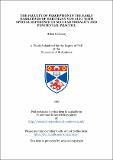The faculty of perception in the early narratives of Hartmann von Aue : with special reference to secular morality and penitential practice
Abstract
This thesis was conceived in response to the recent controversy in Hartmann scholarship concerning the existence of a psychological progression in Hartmann's characters. Whilst the majority of scholars argue that a progression does exist in these works, three scholars in particular, Rudolf Voβ, Hubertus Fischer, and Otfrid Ehrismann, claim that Hartmann remains unconcerned with the inner world of his characters. Instead, they suggest that he depicts perfect protagonists who are affected by a visitation of objective sin (Voβ), or who react primarily to the demands of secular honour (Fischer) or courtliness (Ehrismann). The present study attempts to re-examine the issue of ethical progression in Hartmann's three earliest narratives. This is achieved principally by considering the ability of the characters to perceive and to make ethical judgements on the basis of their mental deliberations. This evidence is considered in the light of the objections of the scholars mentioned above. In particular, their work has reminded scholarship that Hartmann's narratives cannot be interpreted in terms of modern individual morality. Similarly, their arguments lead one to surmise that an ethical dimension in these works would be likely to reflect Hartmann's status as a clerically-educated secular poet and the concerns of his secular audience, rather than specific theological developments relating to self-awareness. A moral dimension in these works would therefore be likely to be informed by lay ethical notions and a general awareness of theological concepts concerning perceptiveness, such as would be broadcast through the penitential system. The present study attempts therefore to set the evidence pertaining to perceptiveness and ethical behaviour in Hartmann's works within the context of the lay morality shared by this poet and his audience.
Type
Thesis, PhD Doctor of Philosophy
Collections
Items in the St Andrews Research Repository are protected by copyright, with all rights reserved, unless otherwise indicated.

